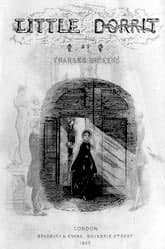Little Dorrit
 First edition title page
First edition title pageFirst publication
1855–1857 in 19 instalments
First book publication
1857
Literature form
Novel
Genre
Literary
Writing language
English
Author's country
England
Length
Approx. 348,000 words
Killing social evil with kindness
You could make a case for every Charles Dickens novel being atypical in some way, but Little Dorrit really is a special case.
It's been called his most political novel—the book George Bernard Shaw said converted him to socialism and other great figures considered an example of Christian writing by Dickens.
But social criticism by itself is not enough to set Little Dorrit apart. Hard Times, Barnaby Rudge and A Tale of Two Cities are all centred on political—even revolutionary—movements. And many of his less overtly political writing, like Oliver Twist and Bleak House—contain strong elements of social criticism.
But most of those works also contain brilliantly memorable characters who give them a life outshining the social drama. In Little Dorrit we see Dickens straining to create such personages, but none of them do come into their own, which may be why the novel has faded somewhat in the public's heart over the years. We have no indelible human image to hang on to.
Little Dorrit, herself, may be the best candidate for the Pip or Oliver treatment in this novel but, like many of the author's good female characters, she is too good. Where her self-sacrificing, altruistic impulses come from, we never know, apart from some vague religious musings. Despite being the titular character, she is a quiet little mystery, forever unsolved, off to the side of the serious action. We admire her and we yearn for her and the actual central character, Arthur Clennam, to recognize their mutual feelings and join together. But we never really know her.
Similar comments can be made about other characters who come and abruptly go in Little Dorrit. They are fleshed out to serve the plot and perform entertainingly enough, yet never jump off the page. They remain characters, or in some cases caricatures, rather than human beings we can fully empathize with. The villains do villainous deeds, but for evil-doing they can't hold a candle to the British institutions being critiqued.
And maybe that's all right. Maybe it's more important that this novel raise questions about society rather than comfort readers with personal melodrama. The Circumlocution Office, an exemplar of bureaucracy designed to prevent social change and preserve the interests of the elite, may be a Dickens creation as great as any of his colourful characters. (It's supposed to be based on the actual British Treasury.)
Social pretensions
In commentaries on Little Dorrit, much is often made of the treatment of debtors, represented by the incarceration of the Dorrit family in the notorious Marshalsea prison (where Dickens's own father had once lived). The well-being of the Dorrits in prison, though, does not seem as bad as that of many of Dickens's impoverished characters at liberty in other novels. And the Marshalsea, which had a real history of the most horrific oppression, had been closed for over a decade when Little Dorrit was published.
The more effective criticism in my view is throughout the novel in all the major and minor depictions of the social system, the interaction of the castes, the pretensions of the affluent, criminal business dealings regarded as awe-inspiring acts of social benefit, squalid self-interest paraded as patriotism. These are the elements that give breath to Little Dorrit.
In general, the work appears overlong, meandering, having too many characters entering and leaving seemingly arbitrarily, as if Dickens was casting about for ways to add subplots to meet his weekly quota of words. (This is often said of Dickens—that he continually padded his stories with long descriptions and unnecessary twists to churn out his instalments for serial publication—but not always fairly. In Little Dorrit, though, the criticism applies.)
The novel does come alive with great sardonic swatches of inspired wordsmithing as Dickens grips the issues that impassion him. Some of the deepest-felt and satirical writing of his career is found in Little Dorrit.
There's a gathering excitement as the various plots start to come together in each of the two major parts of the novel.
In the end though, the author's outrage is blunted by his resorting to tried and true formulas to resolve the personal stories: the unexpected inheritance of a fortune, an inexplicable change of heart by a dark figure, a minor character coming forward to expose a wicked one.
We are left with no political reforms put forward, only the rather dubious suggestion that we could profit by emulating the kind Little Dorrit.
One gets the sense Dickens had said all he wanted on the great issues and wanted to wrap up the human story as neatly as possible.
As you will when you read it.
— Eric

